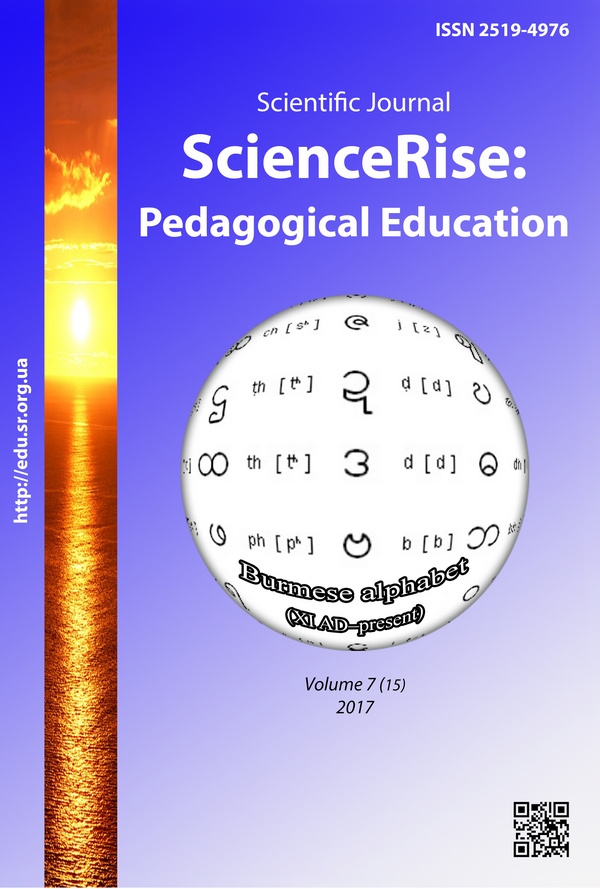Carrier competence of future engineers-mechanics: essence and structure
DOI:
https://doi.org/10.15587/2519-4984.2017.107496Keywords:
professional training of engineers-mechanics, carrier, competence, carrier competence of future engineers-mechanicsAbstract
The research position as to the essence and structure of the carrier competence of future engineers-mechanics is presented in the study. Based on the analysis, synthesis, abstraction and generalization of independent assessments there were established that the essence of the carrier competence as an integrated quality of future engineers-mechanics characterizes their aspirations, readiness and ability to the professional self-realization in the processes of improvement and growth of the production effectiveness, attended by a reflexive vision of oneself, adequate self-estimation, and determines the purposeful process and also the result of the professional career development. The structure of the professional competence was determined in the unity of the motivation-axiological, cognitive-procedural, subjective-activity, reflexive-evaluative components. In the content of the motivation-axiological component we distinguish correspondent axiological-worldview positions, professional interests, attitudes, motivations, affiliations, needs for achievements, aspirations. Elements of the cognitive-procedural component include correspondent notions, scientific-theoretical erudition, ideas, skills, individual-professional qualities that provide an understanding of the engineer-mechanic’s professional activity as an initial career stage. The subjective-activity component is concretized by correspondent actions of future engineers-mechanics, individual-personal qualities, mechanisms of self-actualization as a process of activation of abilities and professionally essential qualities of future engineers-mechanics, directing them on the development of necessary competences to realize their career in the chosen field of the professional activity. The reflexive-evaluative component is manifested in:
– ability to an adequate estimation of own possibilities of the professional and career growth, readiness to reflection to overcome career crises, solution of career problems, in abilities to understand personal career achievements;
– skills of a systematic analysis and self-estimation of individual-personal qualities and results of the professional training in the context of ideas about the future professional success and career development
References
- Mogilevkin, E. A. (2007). Kar'ernyi rost: diagnostika, tekhnologii, trening. Saint Petersburg: Rech, 336.
- Orlov, V. F., Fursa, O. O. (2015). Problemy proektuvannya profesiynoyi karyery maybutn'oho dyzaynera. Mystets'ka osvita: zmist, tekhnolohiyi, menedzhment. Seriya: Pedahohichni nauky, 10, 5–16.
- Sadon, E. V. (2009). Professional'nye kompetencii kak faktor stanovleniya professional'noy kar'ery budushchego specialista. Vladivostok, 38.
- Suryakova, M. V. (2013). Uyavlennya pro profesiynu karyeru maybutnikh inzheneriv-metalurhiv. Metal Jornal, 31 (10). Available at: http://www.metaljournal.com.ua/professional-career-of-metallurgic-engineer
- Yanchenko, I. V. (2013). Model' formirovaniy kar'ernoy kompetentnosti studentov v professional'nom obrazovanii. Fundamental'nye issledovaniya, 10, 437–441.
- Bazhin, A. S. (2007). Kar'era i professional'nye kompetencii specialistov. Vysshee obrazovanie segodnya, 9, 37–39.
- Kanivets, T. M., Karamushka, L. M. (2012). Motyvatsiynyi komponent psykholohichnoyi hotovnosti studentiv vyshchykh navchal'nykh zakladiv do zdiysnennya maybutn'oyi profesiynoyi karyery: zmist, struktura, riven' rozvytku. Aktualni problemy psykholohiyi. Vol. 1: Orhanizatsiyna psykholohiya. Ekonomichna psykholohiya. Sotsial'na psykholohiya, 34, 264–272.
- Karamushka, L. M., Kanivets, T. M. (2012). Kohnityvnyi komponent psykholohichnoyi hotovnosti studentiv vyshchykh navchal'nykh zakladiv do zdiysnennya maybutn'oyi profesiynoyi karyery: riven' ta chynnyky rozvytku. Teoriya i praktyka upravlinnya sotsial'nymy systemamy: filosofiya, psykholohiya, pedahohika, sotsiolohiya, 4, 3–13.
- Man'ko, V. M. (2000). Dydaktychni umovy formuvannya u studentiv profesiyno-piznaval'noho interesu do spetsial'nykh dystsyplin. Sotsializatsiya osobystosti, 2, 153–161.
- Shcherbak, O. I., Nychkalo, N. H. (Ed.) (2010). Profesiyno-pedahohichna osvita: teoriya i praktyka. P. 1. Kyiv: Nauk. svit, 279.
- Natsional'na ramka kvalifikatsiy: dodatok do postanovy Kab. Ministriv Ukrayiny vid 23 lystop. 2011 r. No. 1341 (2012). Vyshcha shkola, 3, 104–111.
- Pro vyshchu osvitu (2014). Verkhovna Rada Ukrayiny, 1556-VII. Available at: http://zakon2.rada.gov.ua/laws/show/1556-18
- Raven, Dzh. (2002). Kompetentnost' v sovremennom obshchestve. Vyyavlenie, razvitie i realizaciya. Moscow: Kogito-Centr, 396.
- Busel, V. T. (Ed.) (2005). Velykyi tlumachnyi slovnyk suchasnoyi ukrayins'koyi movy. Irpin: Perun, 1728.
- Zimnyaya, I. A. (2003). Klyuchevye kompetentnosti – novaya paradigma rezul'tata obrazovaniya. Vysshee obrazovanie segodnya, 5, 35–42.
- Markova, A. K. (1996). Psihologiya professionalizma. Moscow: Mysl, 308.
Downloads
Published
How to Cite
Issue
Section
License
Copyright (c) 2017 Maryna Klymenko

This work is licensed under a Creative Commons Attribution 4.0 International License.
Our journal abides by the Creative Commons CC BY copyright rights and permissions for open access journals.
Authors, who are published in this journal, agree to the following conditions:
1. The authors reserve the right to authorship of the work and pass the first publication right of this work to the journal under the terms of a Creative Commons CC BY, which allows others to freely distribute the published research with the obligatory reference to the authors of the original work and the first publication of the work in this journal.
2. The authors have the right to conclude separate supplement agreements that relate to non-exclusive work distribution in the form in which it has been published by the journal (for example, to upload the work to the online storage of the journal or publish it as part of a monograph), provided that the reference to the first publication of the work in this journal is included.








